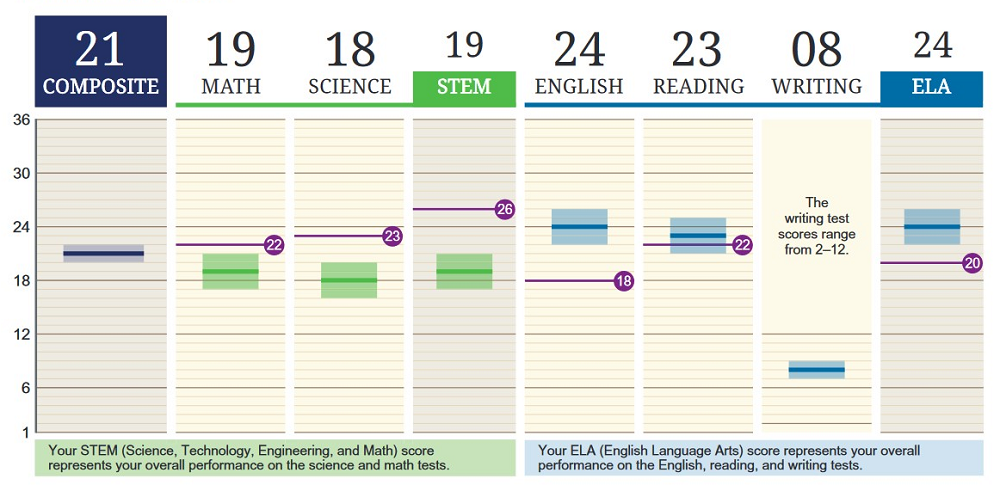
Is there a correlation between ACT scores and college success? Your ACT scores play a huge factor in your college admissions process, and a good score is a solid way to show admissions offices your skills. But, do they indicate that you’ll be successful once you’re in college?
We’re exploring everything you need to know about the importance of the ACT test, and diving into whether the exam can accurately measure college performance.
About the ACT Exam
According to the ACT’s website, this exam is designed to reflect what students learn in school and provide institutions of higher education with data for recruiting and admitting students. The scoring’s purpose is to clearly showcase the breadth of a student’s knowledge learned in high school, measuring “…skills that are most important for success in postsecondary education and that are acquired in secondary education.”
If you’re familiar with the SAT, the ACT is similar, but the two exams have different sections and scoring. The ACT contains four multiple-choice tests—English, Mathematics, Reading, and Science, each of which assesses the skills students typically learn throughout their various high school ELA, math, and science courses. Each test has a score range of 1-36, and these four scores are averaged to determine a Composite score. There is also an optional writing test, scored separately.
Most commonly, 11th and 12th graders take the ACT in preparation for their college applications. It costs $68 to register (without the writing portion and without a fee waiver), and test dates are available throughout the school year. Students can also take this exam multiple times to improve their scores. Some states require students to take the ACT as a graduation requirement, while others require only the SAT or one of the two tests, so check if your state (or school) has any such requirements before registering to take a test.
What You Need to Know About the ACT and College Admissions
The ACT is not required for all colleges—generally, schools require students to submit their ACT or SAT scores as a part of their application, but many also have an exam preference. In the past few years, several universities have adopted new policies for evaluating test scores.
Test-optional policies (such as at UT Austin) allow first-year applicants to decide whether or not they’ll send in their ACT (or SAT) scores, while test-blind or test-free policies (like at the University of California system) do not evaluate test scores at all—a favorable policy for students that aren’t strong testers. When students do not submit their scores in test-optional cases, their admission is judged based on their transcripts, GPA, AP credits, and other academic measures; still, admission chances are improved when a good test score is included.
So what is a “good score” on the ACT? The national average composite (total) ACT score of 2023 graduates is 19.5, and the average for each section ranges from 18.6 in English to 20.1 in reading. Most students place in this median score, which means that earning just 1 point above the average (at a score of 20) will place you in the top 50th percentile—above average. Earning above a 21 isn’t a bad score, then, and a result in the upper 20’s is pretty good. (The sample score report below demonstrates how you’ll receive your scores.)
A truly “good” score is subjective, since it depends on the average score of the students that have already been accepted to the schools you’re interested in. For example, if you’re aiming for an Ivy League or an excellent private college, set your sights on a goal score around 33-36—the middle 50% of scorers enrolled at Yale, Emory, and Stanford are all within this range.
Do ACT Scores Correlate to College Success?
ACT scores are generally important for college admissions—but can they predict your success once you’re there? Research institutions have been studying the ACT’s correlation with college readiness for years.
One 2012 study by the ACT studied over 190,000 students who enrolled in college from 2000 to 2006, including over 100 institutions. The study determined that both a student’s ACT score and their high school GPA (HSGPA) effectively predicted long-term success during college. Overall, they found that ACT scores were a more accurate predictor, and that ACT benchmarks also provided compelling evidence. But, this study was completed by the ACT. What about studies that aren’t affiliated?
A 2020 University of Chicago Consortium study found that the relationship between HSGPA and college success was far more consistent than that of ACT scores and college success. The researchers studied about 55,000 Chicago public high school seniors graduating between 2006-2009 that immediately enrolled in a 4-year college, and findings showed that a higher GPA accurately predicted college graduation. While each additional GPA point increased the chances of a student graduating from college, students’ ACT scores didn’t correlate with college graduation rates at all—in some schools, higher ACT scores even resulted in lower graduation rates.
Instead of defining “college success” as college graduation, other studies define it with a high first-year GPA. They generally find that a combination of both HSGPA and ACT scores is the best predictor of success (good grades) in college: “In fact, combining high school GPA and ACT scores is a much stronger predictor of future success for students regardless of race or gender than using either of these scores alone as a predictor,” (Bleyaert 2010).
So, an ACT score can give some indication of success at college at times. However, it seems that the best predictor of college success is a student’s GPA in high school, as it correlates to both college graduation rates and college GPA. This is likely because the ACT is a snapshot of a student’s knowledge and stamina on their particular test day, while a full transcript with a GPA and more will describe how the student handles their workload over a longer period of time.
Is the ACT Necessary?
The argument for using test scores instead of grades as measures of academic readiness/performance is that GPAs aren’t a clear, uniform measure across schools (high schools across the country vary widely in academic quality and rigor) and standardized tests are a way to clearly evaluate and compare students. If tests like the ACT don’t produce scores that accurately correlate to academic performance… why are they important?
It’s no secret that the anti-standardized testing movement is growing. Especially due to the Varsity Blues scandal and learning loss from the pandemic, more and more individuals are leaning towards test-optional colleges, and more and more colleges are switching to test-optional policies. In a 2014 study of 33 test-optional schools, researchers found that there was very little difference in the college GPAs between the 123,000 students that either did or did not hand in their test scores.
Still, this doesn’t directly correlate with the necessity of the ACT test, and it doesn’t mean that your ACT score isn’t important. As we mentioned above, many states and schools still require it for graduation. Even if the ACT is not required, it can set your college application apart from other students with similar high school records. A good ACT (or SAT) score is a smart way to show off your skills to the colleges of your choices, even if your school records and other scores paint a different picture.
Even if ACT scores don’t directly predict your college success or aren’t a requirement for you, there are many practical benefits in taking the ACT and earning a good score that will improve your college experience. Colleges and universities often use test scores like the ACT in order to place students in the right level courses (an excellent math section score demonstrates a good understanding of beginners’ math, so your college may save you the cost of that intro class and enroll you directly in a higher level course). Depending on where you live, an adequate ACT score can also grant you automatic admission to certain universities—for example, Texas students in the top 50% of their class only need a 24 on the ACT for assured admission to the University of Houston. Finally, many scholarship programs award students based on their ACT scores.
Improve Your ACT Scores with Piqosity’s Test Prep Packages
So, is there a correlation between ACT scores and college success? Not really. Your ACT score probably indicates very little about your future success at college. So, don’t stress if your score ends up being lower than you’d like. Continue to put in the effort during college, and you’ll have every chance of succeeding. The better question is: is the ACT test important? Yes.
Wondering how to improve your ACT score? Consider Piqosity’s ACT test prep and our ACT test strategies. Along with our full-length, online ELA and Math courses for grades 5-11, we offer full test prep courses for the SAT, ACT, and ISEE exams, each of which includes 12 practice exams, dozens of concept lessons, personalized practice software, and more.
New to Piqosity? At no cost, you can register for our Community package, which gives you access to a free diagnostic test that will tell you exactly what your strengths and weaknesses are when it comes to taking the ACT! After signing up, you will have access to these materials—and more—for 365 days. Start preparing for your ACT today with Piqosity!
More Educational Resources by Piqosity:



